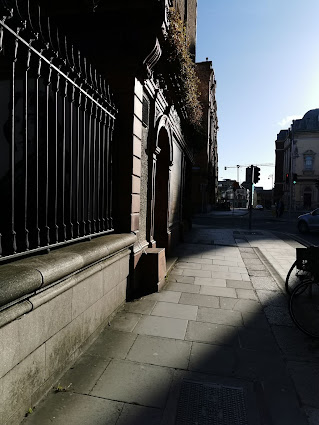THE GIFT OF HISTORY
Doug Dunn
The
last time I studied history was 50 years ago. My teacher seemed to encouraged seemed
my history class learn dates and important facts by heart. I remember listening
to him read the French Revolution textbook while underlining the important bits.
After two years I learned enough of European history to pass the exam.
After
school the only other history class I attended was at university where the
history of science was part of my Astrophysics course. That was more of an
inquiry than parrot learning and more interactive.
After
my school and university I had no more history education in that subject. I
decided history was something not very relevant to my job as an IT trainer and was
not something I enjoyed talking talk about with my friends and family. I still
remember a few names of famous writers such as Voltaire, 1694-1778, and that he
contributed to the French Revolution through being an outspoken advocate of
civil liberties. But I had no sense of who he was or anything about his life.
Now
during the Covid-19 pandemic I have been listening to the radio every day and I
tune into my favorite shows. I am starting to like history programs
and podcasts from any period and for no particular reason. I am starting
to see that my view of the world is a product of the views of many people
throughout history.
For
example, one of the BBC Radio 4 episodes of In Out Time was about the life of
Émilie du Châtelet. I had never heard of her and prior to Covid
lockdown I may well have switched stations. I got to learn she was a natural
philosopher and aristocrat living in France in the first half of the eighteenth
century. When it was mentioned that one of her lovers was Voltaire,
that name from my textbook rang a bell. It turned out, according to the panel
of experts answering Melvin Bragg’s questions, she had a wonderful relationship
with Voltaire. They said it was more like a companionship which
lasted for the last 15 years of her life. Voltaire was very
interested in the work of Isaac Newton and embarked on a project of writing a
book about him. Émilie, being a much better mathematician, was able to help
Voltaire by explaining Newton’s theories. She translated the Principia
Mathematica from Latin to French, not just word for word but with understanding
of his new concepts of science and mathematics.
Émilie
du Châtelet came from a privileged background and rubbed shoulders with many
aristocrats connected to the French royal court. At a young age she
learned Euclidean geometry, Latin and Italian though attending tutor sessions.
She married and was supportive to her husband and their
children. Her marriage was amicable despite taking lovers with whom
she explored philosophy and science. She worked extremely hard but said the
most important thing in life was to get pleasure from it.
I
liked hearing about Voltaire’s visit to London. He wrote: ‘I left Paris and it
was full and came to London and it was empty’. Parisian science
according to Descartes saw matter as full. Nothing could move unless something
bangs into it. But according to Newton, the cosmos comprised vast tracks of
empty space with objects attracted at distance by a force called gravity.
I
also learned that on Christmas night in 1758 Halley’s Comet reappeared as
predicted. Edmond Halley died in 1742 so he didn’t get to see his prediction
come true, but its appearance in the sky right on schedule was hailed as a
triumph for scientific reasoning and Newtonian physics. At the same time,
though no-one knows how, a new publication reappeared of Emilie du Chatelet’s
Principia Mathematica translation. Her work allowed people to understand what
Newton had discovered.
So
why do I say history is a gift? Today, with Google, information about everyone
is just one or two clicks away. Thousands of volunteers give their
time to research and update Wikipedia. I was surprised to see Émilie du
Châtelet died at the young age of 43 and Voltaire at 83. Wikipedia
is a gift, giving people free access to a vast amount of information. And what
people like Émilie du Chatelet did was also a gift to us all and to humanity.
Dedicating her life to the exploration of science and philosophy was a gift.
Who
are the gift givers of today? There are so many. One or two that come
immediately to mind from what I am currently reading: Lewis Hyde, author of The
Gift and Yuval Harari, author of Sapiens: A Brief History of Mankind. I also
watched a documentary called Gift based on Lewis Hyde’s ideas around 'gift
economy'. Through reading these books I am starting to view history as a series
of gifts.
The
other day a group of astronomers enjoyed a moment together over Zoom with millions
of other viewers. We watched the Perseverance space probe parachute onto the
surface of Mars. It was wonderful to share the celebration of that
achievement. We also listened to a talk about the latest theories of
galactic clusters. How amazing that we can discuss such things. I am grateful
for explorers of science throughout the ages that they gave their time for the
benefit of us all.


Comments
Post a Comment